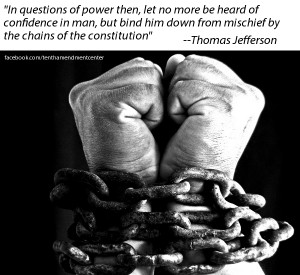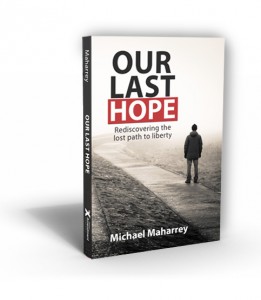Podcast: Play in new window | Download (Duration: 10:20 — 9.5MB)
 “In questions of power, let no more be heard of confidence in man, but bind him down from mischief by the chains of the Constitution.” – Thomas Jefferson
“In questions of power, let no more be heard of confidence in man, but bind him down from mischief by the chains of the Constitution.” – Thomas Jefferson
The Constitution was written for times such as these.
The debate over gun control raging in the wake of the mass shooting at a Connecticut elementary school vividly illustrates the need for constitutional chains.
Emotions boiled over after the tragedy at Sandy Hook Elementary. Americans reacted in stunned disbelief, anger and a deep sense of sadness. Questions chased each other through the airwaves and across the Internet. How could anybody do such a thing – to children? And how can we stop it from ever happening again?
Most people recognize they will never understand what drives a person to gun down innocent kids in a school. We ask the first question rhetorically, more an expression of our incredulity rather than a query demanding acknowledgement.
But the second question, ah, that one demands an answer.
How do we stop it from ever happening again?
Human beings generally suffer from myopia, but politicians take delusions of grandeur to the highest level. They want you to believe that the right policy, properly implemented, will solve any problem and prevent any calamity. You just have to let them do their thing.
President Obama vowed to use the power of his office to prevent another tragedy like the massacre in Connecticut.
“We can’t accept events like this as routine,” he said. “Are we really prepared to say that we’re powerless in the face of such carnage? That the politics are too hard? Are we prepared to say that the violence visited on our children year after year after year is somehow the price of our freedom?”
And the president called for action.
“We can’t tolerate this anymore,” he added. “These tragedies must end, and to end them, we must change. We will be told that the causes of such violence are complex, and it is true. No single law, no set of laws can eliminate evil from the world or prevent every senseless act of violence in our society. But that can’t be an excuse for inaction. Surely we can do better than this.”
As the emotions boil through our very souls, how can we argue with the president? We must DO something. Surely we can come up with a public policy solution that will prevent a deranged gunman from mowing down children. Our “collective grief” demands solutions, so we turn to the government.
Politicians stand ready, all too happy to act on our behalf.
Ban assault rifles.
Ban high capacity clips.
Ban all guns.
Just do something.
Let’s be honest; we can’t look at the photo of a 6-year-old child ruthlessly gunned down in the hallway of his school and not feel a sense of rage. We can’t look into the eyes of a grieving mother and hear her voice cracking as she tries to come to grips with the fact that her little girl will never come home again and not bend under the overwhelming pressure of sadness.
Pain.
Grief.
Our humanity demands such a response.
But raw emotion should never drive policy decisions.
Of course, politicians love emotion. Rahm Emanuel summed up the mentality of the modern policy-maker when he said, “Never let a crisis go to waste.”
The mindless mantra repeated by a grieving citizenry clamoring for lawmakers to “just do something,” empowers politicians to do just about anything, often with dreadful long-term consequences.
“Doing something” after planes flew into the World Trade Center ultimately gave us genital groping at the airport, Patriot Act spying, long, bloody wars in Iraq and Afghanistan, presidential kill lists, torture and indefinite detention.
In retrospect, perhaps a little pause for some post-9/11 thought and consideration before plunging forward and “doing something” would have been apropos.
But make no mistake – your government officials don’t want that kind of pause. They don’t want a rational debate. They don’t want careful consideration. They want power. And an emotionally distraught citizenry gives them an avenue to seize it.
Keep in mind, even after the current tragedy fades into the yellowing pages of a history book, the powers seized by the government in the wake of the calamity will remain tightly held. And you will never get back the accompanying loss of liberty.
That’s why we must apply the chains of the Constitution.
For times such as these.
The framers and ratifiers of the Constitution understood our “leaders” would always seek to extend their own power. So, they insisted on a Constitution limiting the authority of the federal government to specific, enumerated objects. Then they went a step further, demanding a Bill of Rights “in order to prevent misconstruction or abuse of its powers.”
Adherence to the Constitution prevents a reckless trampling of basic rights in the wake of an emotional tragedy or national emergency. It serves as a check on federal power and forces careful consideration. If there was not a Second Amendment, do you think for a moment that United States government would allow its citizens to own any type of weapon?
Certainly not.
But ultimately, “We the People” hold the key. We must apply the chains. The Constitution won’t enforce itself. Chains don’t come with a self-application mechanism. It takes vigilance, diligence and persistence to restrain the federal government and protect liberty, especially in times of turmoil. We must insist they follow the Constitution – every issue, every time, no exceptions, no excuses.
Even as we mourn, even as Americans plea for action, we must resist the urge to unshackle the policymakers and the politicians. We simply cannot trust them with unfettered power.
“Show me that age and country where the rights and liberties of the people were placed on the sole chance of their rulers being good men, without a consequent loss of liberty?” – Patrick Henry
- Anti-Federalist Objections: Pennsylvania Dissent Explained - December 16, 2024
- A Republic at Risk: Cato’s Anti-Federalist Warnings - December 9, 2024
- Reversing Gresham’s Law: How Sound Money Could Drive Out Fiat - December 6, 2024

